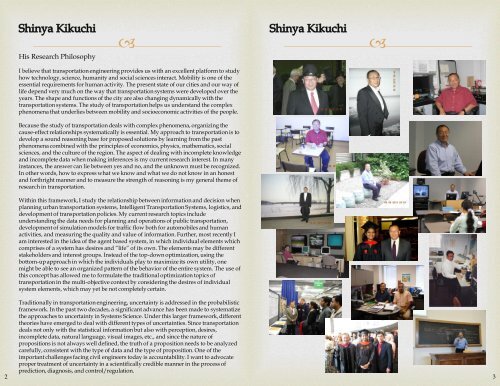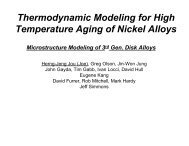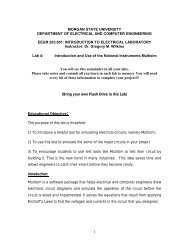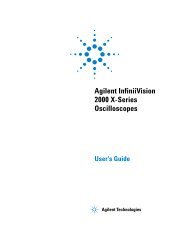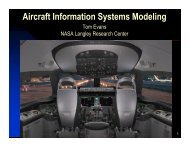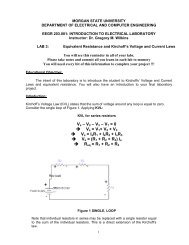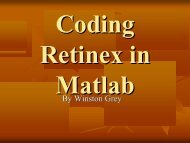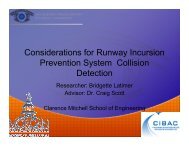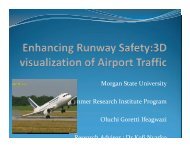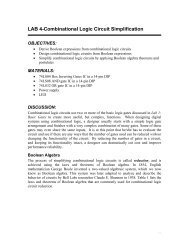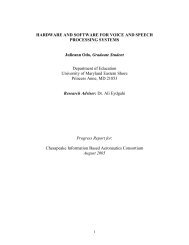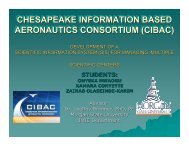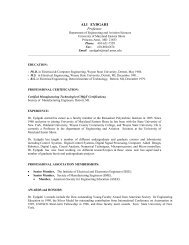In Loving Memory of - Morgan State University
In Loving Memory of - Morgan State University
In Loving Memory of - Morgan State University
- No tags were found...
You also want an ePaper? Increase the reach of your titles
YUMPU automatically turns print PDFs into web optimized ePapers that Google loves.
2His Research PhilosophyI believe that transportation engineering provides us with an excellent platform to studyhow technology, science, humanity and social sciences interact. Mobility is one <strong>of</strong> theessential requirements for human activity. The present state <strong>of</strong> our cities and our way <strong>of</strong>life depend very much on the way that transportation systems were developed over theyears. The shape and functions <strong>of</strong> the city are also changing dynamically with thetransportation systems. The study <strong>of</strong> transportation helps us understand the complexphenomena that underlies between mobility and socioeconomic activities <strong>of</strong> the people.Because the study <strong>of</strong> transportation deals with complex phenomena, organizing thecause-effect relationships systematically is essential. My approach to transportation is todevelop a sound reasoning base for proposed solutions by learning from the pastphenomena combined with the principles <strong>of</strong> economics, physics, mathematics, socialsciences, and the culture <strong>of</strong> the region. The aspect <strong>of</strong> dealing with incomplete knowledgeand incomplete data when making inferences is my current research interest. <strong>In</strong> manyinstances, the answer can lie between yes and no, and the unknown must be recognized.<strong>In</strong> other words, how to express what we know and what we do not know in an honestand forthright manner and to measure the strength <strong>of</strong> reasoning is my general theme <strong>of</strong>research in transportation.Within this framework, I study the relationship between information and decision whenplanning urban transportation systems, <strong>In</strong>telligent Transportation Systems, logistics, anddevelopment <strong>of</strong> transportation policies. My current research topics includeunderstanding the data needs for planning and operations <strong>of</strong> public transportation,development <strong>of</strong> simulation models for traffic flow both for automobiles and humanactivities, and measuring the quality and value <strong>of</strong> information. Further, most recently Iam interested in the idea <strong>of</strong> the agent based system, in which individual elements whichcomprises <strong>of</strong> a system has desires and “life” <strong>of</strong> its own. The elements may be differentstakeholders and interest groups. <strong>In</strong>stead <strong>of</strong> the top-down optimization, using thebottom-up approach in which the individuals play to maximize its own utility, onemight be able to see an organized pattern <strong>of</strong> the behavior <strong>of</strong> the entire system. The use <strong>of</strong>this concept has allowed me to formulate the traditional optimization topics <strong>of</strong>transportation in the multi-objective context by considering the desires <strong>of</strong> individualsystem elements, which may yet be not completely certain.Traditionally in transportation engineering, uncertainty is addressed in the probabilisticframework. <strong>In</strong> the past two decades, a significant advance has been made to systematizethe approaches to uncertainty in Systems Science. Under this larger framework, differenttheories have emerged to deal with different types <strong>of</strong> uncertainties. Since transportationdeals not only with the statistical information but also with perception, desires,incomplete data, natural language, visual images, etc., and since the nature <strong>of</strong>propositions is not always well defined, the truth <strong>of</strong> a proposition needs to be analyzedcarefully, consistent with the type <strong>of</strong> data and the type <strong>of</strong> proposition. One <strong>of</strong> theimportant challenges facing civil engineers today is accountability. I want to advocateproper treatment <strong>of</strong> uncertainty in a scientifically credible manner in the process <strong>of</strong>prediction, diagnosis, and control/regulation.3


